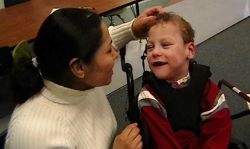Building Communication Through Conversation
Every child who is deafblind, at every moment, is already expressing himself. What he needs is someone who will receive his communication skillfully and enter into conversation with him. Out of that conversation will grow relationship and language. (Miles, 1999, p. 57)

Meaningful conversations are important for overall quality of life and for forming and deepening relationships. For children who are deafblind, they are also an essential building block of communication development.
Conversations involve turn-taking between the child and communication partner. They do not require language. As Barbara Miles (1999, p. 57) writes:
Conversational interaction precedes language. It is not the other way around. If you reflect for a moment, you will see that this is true for children with vision and hearing. Infants and their caregivers engage in countless nonverbal conversations before the children learn their first words. They exchange eye gazes, smiles, a huge variety of facial expressions, movements, and sounds. Back and forth.
Children who are deafblind usually miss the opportunities for the same kind of natural conversational interaction and natural exposure to language. But if they have adults and partners around them who know how to have conversations with their hands, with their bodies, and with touch and movement, then they will not miss out. Without such partners, they will become passive, isolated, and increasingly uncommunicative.
See also: Emerging (Presymbolic) Communication
Introductory Resources
Learn More
Reference
Miles, B (1999). Conversation: The essence of communication. In B. Miles & M. Riggio (Eds.), Remarkable conversations: A guide to developing meaningful communication with children and young adults who are deafblind (pp. 54-75). Perkins School for the Blind.
KEEP EXPLORING